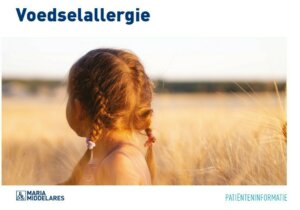Food allergy
Symptoms and causes
Symptoms and causesWhat is it?
A food allergy is an adverse reaction that the immune system has to certain, generally safe, food proteins (allergens), such as cow's milk, soy, eggs, nuts, kiwi, etcetera. One of every thirteen children have a food allergy at the age of 1. This falls to 2-34% of children at 6 years old and then remains a fairly stable percentage in older children.
A food allergy is not a food intolerance.
The terms 'food allergy' and 'food intolerance' are often used interchangeably. When there is an allergy, the body react to a food protein. When there is an intolerance, the body reacts to sugars (e.g. lactose, or milk sugar). Often, patients who have an intolerance can still digest small quantities of sugars. The symptoms also differ in type. With an intolerance, the symptoms are never life-threatening (in contrast to an allergic reaction).
Symptoms
There is a diverse variety of reactions, which may include skin, respiratory, oral, throat, stomach or intestinal symptoms. The severity of the reaction depends on the type of allergen, as well as the method of preparation and quantity consumed. Sometimes even just traces of the allergen can lead to a reaction.
See the leaflet below for more information.
Only available in Dutch:

Voedselallergie
DownloadDiagnosis and treatment
Diagnosis and treatmentDiagnosis
- extensive anamnesis and clinical research
- If necessary, additional testing with skin tests and blood draws, performed by our paediatric nurse.
- discussion of the results and creating a customised treatment plan
Treatment
- counseling with our nutritionist
- information and demonstration on the use of medication
- information sessions on anaphylaxis
information sessions on anaphylaxis
The anaphylaxis sessions are intended for parents, grandparents, child carers, teachers and other care providers responsible for the daily care of a child with a dangerous food allergy, as well as adolescents with a high risk of anaphylaxis.
Recognising and treating an anaphylactic reaction properly are discussed extensively during these information sessions. We hope that education, along with greater awareness, will also help reduce anxiety and fear.
Treatment centres and specialisations
Treatment centres and specialisationsLatest publication date: 02/08/2024
Something wrong or unclear on this page? Report it.






